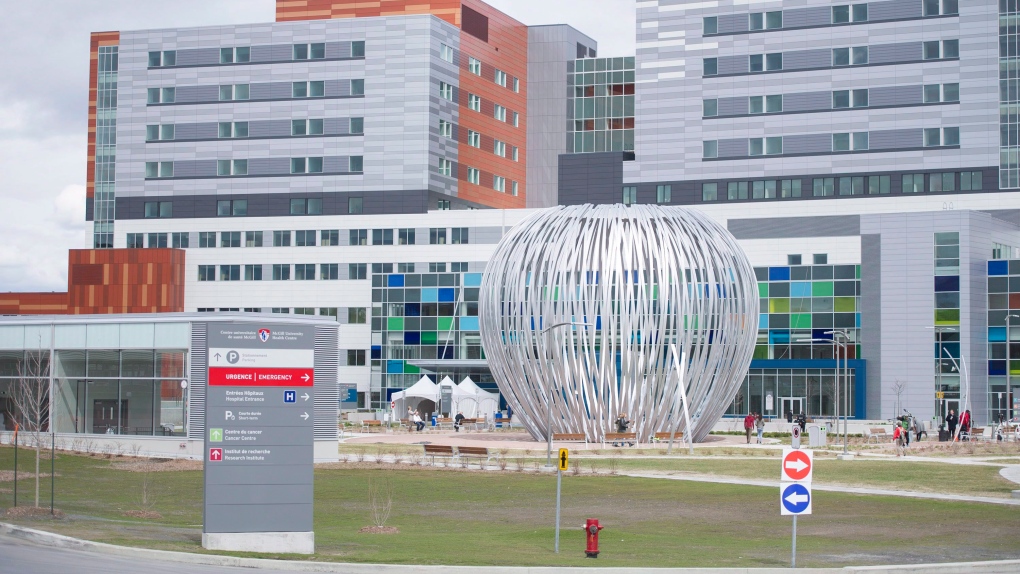'Very, very concerned': MUHC has lost 12 beds in cancer ward since November
One-third of the beds in the McGill University Health Centre's cancer ward has closed since last fall due to staff shortages, which is raising concerns on what effects this might have on patients, CTV News has learned.
Five months ago, the MUHC's oncology department had 36 beds. However, six of them closed in November and another six shut down last Friday.
"Labour shortages resulting in bed closures are affecting the entire health-care network, and the McGill University Health Centre (MUHC) is no exception," wrote spokesperson Bianca Ledoux-Cancilla in an email on Wednesday.
The head of the MUHC Patients' Committee says the loss of beds for cancer patients is a worrying trend — one that elected officials need to address immediately.
"Every department in the hospital is a big deal. Bed closures for patients in every department are a big deal and patients have every right to be very, very concerned about this," said Ingrid Kovitch in an interview.
"We see staffing shortages that seem to be getting worse so there are progressive closures of beds and the beds that are actually open, there's a huge percentage, like upwards of 15 per cent, are occupied by patients no longer requiring hospital care but who are waiting for a bed in a more appropriate setting, like a long-term care facility or a rehabilitation centre. The effective number of beds available for patients needing hospital care is shrinking and shrinking."
 Ingird Kovitch, chair of the MUHC patients' committee, speaks to CTV News on Wednesday, Feb. 22, 2024. (CTV News)
Ingird Kovitch, chair of the MUHC patients' committee, speaks to CTV News on Wednesday, Feb. 22, 2024. (CTV News)
The loss of beds comes as the province is trying to lure nurses who went into private health care back into the public system.
The MUHC says that it will ensure that patients are "treated by the appropriate teams" through other kinds of services, and that the centre is "actively" trying to recruit clinicians and staff to reopen the beds, as well as others that were closed in recent years.
It will take serious political will for the province to address the problem, according to Kovitch, who says making more spaces in long-term care centres and rehabilitation facilities to free up space in the hospitals will ease the burden on the health network.
Health Minister Christian Dubé declined to answer questions from CTV News about the closures.
Premier François Legault didn't say much when asked about it Thursday at the National Assembly. "Of course, as you know, we're in negotiations right now with nurses with the FIQ and what we're trying to get is more flexibility," he told reporters during a press scrum.
 The new MUHC super hospital is shown in Montreal, Sunday, April 26, 2015, on its first day of opening. A massive hospital move is underway in Montreal today as patients are being transferred from the Royal Victoria to the newly-built "superhospital." THE CANADIAN PRESS/Graham Hughes
The new MUHC super hospital is shown in Montreal, Sunday, April 26, 2015, on its first day of opening. A massive hospital move is underway in Montreal today as patients are being transferred from the Royal Victoria to the newly-built "superhospital." THE CANADIAN PRESS/Graham Hughes
Kovitch says the government needs to act because the shortages have far-reaching effects across the health network.
"Emergency rooms are incredibly congested primarily with patients who are admitted to the hospital and who don't have a bed on the ward to go to. That affects the care of every patient coming through that emergency room. And, of course, patients waiting for surgeries that require an ICU bed post-operatively or just another bed on the wards, if those beds don't exist, that causes additional surgery cancellations and delays," she said.
"The government really needs to sit back and analyze where are the shortages that are hurting us, what can they do to address these because the current situation and the current trend is really very, very frightening."
Opposition parties are also telling the Legault government to take action to address the problem.
"For those who are in need of receiving health-care services, the government must act today. Now," said interim Quebec Liberal Party leader Marc Tanguay Thursday at a press scrum.
"Because of their lack of planning and because of the poor conditions, working conditions for health workers, we are … experiencing a shortage [in the] work force," argued Joël Arseneau, the Parti Québécois' health critic.
Patients rights' activist Paul Brunet says it's up to management to solve the shortage problem and not force patients to wait longer.
"Find it. It's your job, not the patients," he said in an interview. "We don't accept that anymore. The kind of money you are paid, you have the obligation of finding adequate alternatives. This is your job."
The MUHC also confirmed it closed the 17 East wing of the Montreal General Hospital that is used to treat patients with superbugs, but it says it is only the physical space that was closed — the beds were moved to other wards.
With files from CTV Montreal's Max Harrold
CTVNews.ca Top Stories

W5 Investigates Provinces look to Saskatchewan on how to collect millions more for victims of crime
A W5 investigation showed how convicted criminals ordered to pay restitution struggled to do so, and how just $7 million of more than $250 million had been claimed. While many provinces struggle to keep track, Saskatchewan is leading the way in making sure victims get their money.
PM Justin Trudeau planning to oversee sizable cabinet shuffle on Friday: sources
Prime Minister Justin Trudeau is planning a sizable cabinet shuffle on Friday, sources confirm to CTV News. The long-awaited reconfiguration of Trudeau's front bench comes amid turmoil for the Liberal government after the shocking resignation of Chrystia Freeland.
Child struck by vehicle south of London has died
According to an online fundraiser organized by a family friend, the boy who was hit by a driver south of London earlier this week has died.
'Tragic and sudden loss': Toronto police ID officer who died after suspected medical episode while on duty
A police officer who died after having a suspected medical episode on duty was executing a search warrant in connection with an ongoing robbery investigation in North York, Toronto police confirmed Thursday.
N.B. Liberal government revises Policy 713, parental consent no longer required for students' preferred names
The New Brunswick Liberals are reversing course on the previous government’s decision to change Policy 713.
Manitoba man wins $40M Lotto Max jackpot, among top 5 jackpots in province's history
A Manitoba man has won one of the top five largest lottery jackpots in Manitoba history.
64 cases of 'norovirus-like' illness linked to raw oysters in B.C., officials say
Dozens of people have become ill after eating raw oysters in B.C. since Nov. 1, public health officials warned Thursday.
Conan O'Brien pays tribute to his parents who died within days of each other
Conan O’Brien is remembering his recently deceased parents. In an interview with the Boston Globe, the former late night television host talked about his mother, Ruth Reardon O’Brien, who died last Thursday, and Dr. Thomas F. O’Brien, who preceded his wife in death three days earlier.
How stimulating the body's largest nerve may relieve severe depression
A yearlong trial of 493 adults, with an average age of 53, found vagus nerve stimulation therapy led to improvement in participants' depressive symptoms, ability to complete daily tasks and quality of life.


































